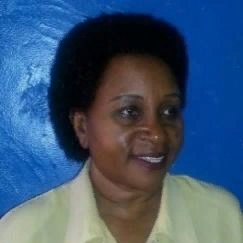
Verdiana Grace Masanja
Work place: Department of Applied Mathematics and Computational Science, Nelson Mandela Institution of Science and Technology, P.O.BOX 447, Arusha, Tanzania.
E-mail:
Website:
Research Interests: Earth Sciences, Earth & Environmental Sciences
Biography
Professor Verdiana Grace Masanja works for the Nelson Mandela African Institution for Science and Technology as a Mathematics Professor. Her PhD (Doktor Ingineur) in Fluid Dynamics is from the Technische Universität Berlin (TUB) awarded in 1986. She is employed as academic faculty from Tutorial Assistant in 1976 till Full Professor in 2006, a position she holds to date. She has held academic managerial positions from Head of Department up to Deputy Vice-Chancellor level. Her research areas include problems of the flow of nanofluids and blood, modelling groundwater, sediment transport, sewage, and clean water distribution systems, and modelling transmission dynamics of diseases of plants, wildlife, and livestock and their vectors and bacteria/ viruses.
Author Articles
Multi-Criteria Decision Making and Numerical Optimization Approaches for Optimizing Water Loss Management Strategies in Water Distribution System - A case of Urban Water Supply and Sanitation Authorities in Tanzania
By Maselle Joseph Kadenge Mashaka Mkandawile Verdiana Grace Masanja
DOI: https://doi.org/10.5815/ijmsc.2020.01.02, Pub. Date: 8 Feb. 2020
Water loss in water distribution systems (WDS) is a serious problem in Tanzania and the third world countries at large. A lot of water is lost on its way before reaching the consumers. This causes a shortage of water supply which leads to loss of revenues of the concerned water authorities. The control or reduction of water loss in the WDS is closely dependent on the commitment of the decision-makers and on the strategies and budget, they set for that purpose. This paper presents a combined model of Multi-Criteria Decision Making (MCDM) and Numerical optimization techniques which may help decision-makers to prioritize and select the best strategies to be used in the management of water loss in the WDS at Moshi Urban Water Supply and Sanitation Authority (MUWSA), Tanzania. The Multi-Criteria Decision Making family methods namely the Multi-Attribute Value Theory (MAVT), Simple Multi-Attribute Rating Technique Exploiting Ranks (SMARTER), and Complex Proportional Assessment (COPRAS) were used to evaluate and prioritize the strategies, whereas the Integer Linear Programming (ILP) technique a numerical optimization technique was used to select the best strategies or alternatives to be employed in water loss management. The results show that the most preferable alternative is replacement of dilapidated pipes while the least preferable alternative is network zoning. The model selects thirteen out of sixteen alternatives, which cost 97% (TZS 235.71 million) of the total budgets set by the water authority to form a portfolio of the best alternatives for water loss management. Furthermore, the model showed robustness as the selected portfolio of alternatives remained the same even when the weights of the evaluation criteria changed.
[...] Read more.Other Articles
Subscribe to receive issue release notifications and newsletters from MECS Press journals